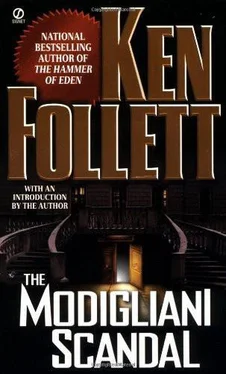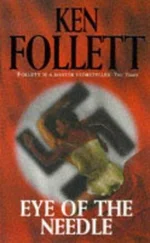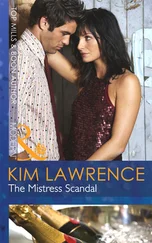Samantha guessed he would mind, from the look on his face, but Cardwell carried on.
″He came to me for some money to buy paintings. I told him I′m a businessman, and that if he wants money from me he has to show me how I can make a profit on the deal. I suggested he go away and dig up a real find—then I would risk my money on him. And thatʹs what he did.″
Julian′s smile to Samantha implied: ″Let the old fool ramble on.″
Tom said: ″How did you come to be a businessman? ʺ
Cardwell smiled. ″It goes back to my rip-roaring youth. By the time I reached twenty-one I had done just about everything: gone around the world, got sent down from college, raced horses and airplanes—not to mention the traditional wine, women and song.″
He stopped for a moment, gazing into his coffee cup, then went on: ″At the age of twenty-one I came into my money, and I also got married. In no time at all, or sooner, there was a young ′un on the way—not Sarah, of course, she was much later. All of a sudden I realized that tearing about was a rather limited occupation. And I did not want to manage the estates, or work in a firm owned by my father. So I took my money to the City of London, where I discovered no one knew much more about finance than I did. That was about the time the Stock Exchange was falling around everyone′s ears. They were all terrified. I bought some companies which, as far as I could see, didn′t need to give a toot what happened to the stock market. I was right. When the world got on its feet again, I was four times as rich as I had been at the start. Since then progress has been slower.″
Samantha nodded. It was much as she had guessed. ″Are you glad you went into business?″ she asked.
″Not sure.″ There seemed to be a note of heaviness in the old man′s voice. ʺThere was a time, you know, when I wanted to change the world, like you young people. I thought I might use my wealth to do somebody some good. But somehow, when you get involved in the business of actually surviving, holding companies together, satisfying shareholders—you lose interest in such grand schemes.″
There was a pause. ″Besides, the world can′t be all that bad when there are cigars like these.″ He gave a tired smile.
″And pictures like yours,″ Samantha put in.
Julian said: ″Are you going to show Sammy and Tom the gallery?″
″Of course.″ The old man got up. ″I might as well show ′em off while they′re here.″
The butler moved Samantha′s chair away as she got up from the table. She followed Cardwell out of the dining room into the hall, then up the double staircase to the first floor.
At the top of the stairs Cardwell lifted a large Chinese vase and took a key from under it. Samantha looked sideways at Tom and noticed that he was taking everything in, his eyes moving quickly from side to side. Something near the bottom of the doorpost seemed to have caught his attention.
Cardwell opened the stout door and ushered them in. The picture gallery occupied a comer room— probably a drawing room originally, Samantha thought. The windows were wire-reinforced.
Cardwell showed obvious pleasure as he walked her along the rows of paintings, telling a little about how he had acquired each one.
She asked him: ″Have you always liked paintings?″
He nodded. ″It′s one of the things a classical education teaches you. However, there′s a lot it leaves out—like the cinema, for example.″
They stopped beside a Modigliani. It was of a naked woman kneeling on the floor—a real woman, Samantha thought, with a plain face, untidy hair, jutting bones and imperfect skin. She liked it.
Cardwell was such a pleasant, charming man, that she began to feel guilty about planning to rob him. Still, he was losing the pictures anyway, and his insurance would pay up. Besides, the Sheriff of Nottingham was probably quite charming.
She wondered, sometimes, whether she and Tom were slightly mad—whether his madness was an infection he had passed on to her—a sexually transmitted disease. She suppressed a grin. God, she had not felt so alive for years.
As they walked out of the gallery she said: ″I′m surprised you′re selling the pictures—you seem so fond of them.″
Cardwell smiled ruefully. ″Yes. But needs must, when the Devil drives.″
″I know what you mean,″ Samantha replied.
III
ʺTHIS IS BLOODY AWFUL, Willow,ʺ said Charles Lampeth. He felt the language was justified. He had come in to his office on Monday morning, after a weekend in a country house with no telephone and no worries, to find his gallery in the thick of a scandal.
Willow stood stiffly in front of Lampeth′s desk. He took an envelope from his inside jacket pocket and dropped it on the desk. ″My resignation.″
″There′s absolutely no need for it,″ Lampeth said. ″Every major gallery in London was fooled by these people. Lord, I saw the picture myself and I was taken in.ʺ
″It might be better for the gallery if I did go,″ Willow persisted.
″Nonsense. Now, you′ve made the gesture and I′ve refused to accept your resignation, so let′s forget it. Sit down, there′s a good chap, and tell me exactly what happened.ʺ
ʺItʹs all in there,ʺ Willow replied, pointing at the newspapers on Lampeth′s desk. ″The story of the forgery in yesterday′s paper, and the terms we′re being offered in today′s.″ He sat down and lit a slim cigar.
ʺTell me anyway.″
″It was while you were in Cornwall. I got a phone call from this chap Renalle, who said he was at the Hilton. Said he had a Pissarro which we might like. I knew we didn′t have any Pissarros, of course, so I was quite keen. He came round with the picture that afternoon.″
Lampeth interrupted: ″I thought it was a woman who took the pictures to the galleries?ʺ.
″Not this one. It was the chap himself.″
″I wonder whether there′s a reason for that,″ Lampeth mused. ″Anyway, carry on.″
″Well, the painting looked good. It looked like Pissarro, it was signed, and there was a provenance from Meunier′s. I thought it was worth eighty-five thousand pounds. He asked sixty-nine thousand, so I jumped at it. He said he was from an agency in Nancy, so it seemed quite likely he would undervalue a picture. I assumed he was simply not used to handling high-priced works. You came back a couple of days later and approved the purchase, and we put the work on display.″
ʺThank God we didn′t sell it,″ Lampeth said fervently. ″You′ve taken it down, now, of course.ʺ
″First thing this morning.ʺ
″What about this latest development?″
″The ransom, you mean? Well, we would get most of our money back. It is humiliating, of course: but nothing compared with the embarrassment of being duped in the first place. And this idea of theirs—low-rent studios for artists—is really quite laudable.″
″So what do you suggest?″
ʺI think the first step must be to get all the dealers together for a meeting.″
″Fine.″
″Might we hold it here?″
″I don′t see why not. Only get the whole thing over with as soon as possible. The publicity is appalling.″
″It will get worse before it improves. The police are coming around later this morning.″
″Then we had better get some work done before they arrive.″ Lampeth reached across his desk, lifted the telephone, and said: ″Some coffee, please, Mavis.″ He unbuttoned his jacket and put a cigar between his teeth. ″Are we ready for the Modigliani exhibition?″
″Yes. I think it will go well.″
ʺWhat have we got?″
″There are Lord Cardwell′s three, of course.″
″Yes. They′ll be picked up within the next few days.″
Читать дальше












